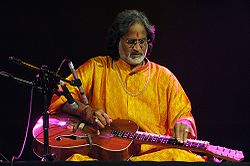Vishwa Mohan Bhatt | |
|---|---|
 Bhatt in 2017 | |
| Background information | |
| Also known as | V. M. Bhatt |
| Origin | Jaipur, Rajasthan, India |
| Genres | Indian classical music |
| Occupation | Musician |
| Instruments |
|
| Years active | 1965–present |
| Website | www |
Vishwa Mohan Bhatt, [1] known professionally as V. M. Bhatt, is an Indian Hindustani classical music instrumentalist who invented and plays a modified slide guitar that is widely called the Mohan veena. [2] [3] [4]
